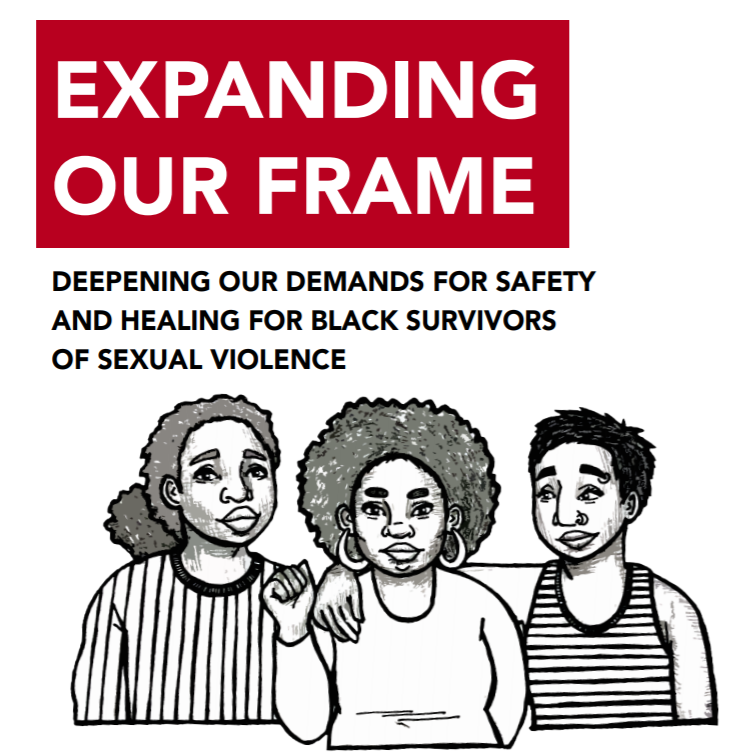Virtual Sexual Assault Awareness Month: Centering the Margin: Individual and Systemic Barriers (Week 4) Round-Up
In the absence of physical space to learn, create, and come together, the Women’s Center is taking Sexual Assault Awareness Month (SAAM) 2020 online. Each week during April, we will focus on a specific topic/theme as it relates to sexual violence awareness and prevention (see image below). Together, via out social media platforms like Facebook,Twitter, and Instagram, we can watch videos, read articles, and engage in other content for learning and skill-building.

UMBC’s Sexual Assault Awareness Month online calendar includes weekly themes to help explore important concepts related to sexual violence awareness and prevention.
But, we get it… Maybe you’re not on Facebook. Maybe you needed to take a break from social media for the day because you’re practicing self-care. Or maybe, you’re still following us on all the things and still missed a pretty cool post. That’s okay! In addition to posting on social media throughout the month, at the end of each week, we’ll provide a round-up of all the content we shared along with some action items to consider doing.
We just wrapped up Week 4 of SAAM with lots of posts and content centered around the theme of “Centering the Margin: Individual and Systemic Barriers.” This meant the posts we shared took a deeper dive into how sexual assault prevention and response often pushes underrepresented and marginalized survivors to the margins. Through resource sharing and consciousness-raising, we hope that as individuals and communities we center these survivors and ensure prevention and response work that takes their specific needs into consideration.
So what did we explore?
- What is cultural betrayal trauma theory? This theory by Dr. Jennifer Gomez is the result of her research focused on the effects of interpersonal trauma (e.g., physical, sexual, and emotional abuse) in diverse populations. Cultural betrayal trauma theory is the idea that some minorities develop what Gomez calls “(intra)cultural trust” – love, loyalty, attachment, connection, responsibility and solidarity with each other to protect themselves from a hostile society. Within-group violence, such as a black perpetrator harming a black victim, is a violation of this (intra)cultural trust. This violation is called a cultural betrayal and it can lead to diverse outcomes, including PTSD (post-traumatic stress disorder) and internalized prejudice. You can learn more here.

A visual representation of cultural betrayal trauma theory.
- Deepening Our Demands For Safety and Healing For Black Survivors of Sexual Violence: “For every Black woman who reports her rape, at least fifteen do not. Many cite a fear that they will not be believed by authorities, or, worse yet, subjected to further violence and criminalization” (Ritchie, Andrea 2017). Read more on Andrea Ritchie’s research and policy brief for “Deepening Our Demands For Safety and Healing For Black Survivors of Sexual Violence”

Image of the cover page for the “Deepening Our Demands For Safety and Healing For Black Survivors of Sexual Violence.”
- Intersectionality Matters with Kimberlé Crenshaw: #MeToo and Black Women: From Hip Hop to Hollywood: Listen to this powerful conversation addressing the historical violence of Black women and what movement building looks like that center’s Black women’s experiences
- Transgender Sexual Violence Survivors: A Self Help Guide to Healing and Understanding : “50% or more of all transgender and gender non-conforming people have experienced some form of sexual abuse, sometimes from many different people over many years.” This helpful guide explores techniques and exercises for healing, descriptions for LGBT services and how to develop a safety plan.
To see everything posted on our accounts last week, check out the hashtag #UMBCsaam over at Facebook, Twitter, and Instagram.
Important Take-Aways:
→ Advocate for policies that combat inequality in education, health care, law enforcement and the judicial system that center the needs of underrepresented communities who experience trauma (to learn more, check out Nadia BenAissa’s URCAD Presentation)
→ Believe Survivors. No matter what identities they hold.
→ Challenge toxic and harmful cultural norms that impact survivors’ mental health. Learn how to support harm doers in being accountable by checking out this video on How to Support Harm Doers in Being Accountable.
Follow the Women’s Center on myUMBC, Facebook, Twitter, and Instagram for SAAM updates and information throughout the month of April. You can also stay up-to-date by following #UMBCsaam
Throughout this time of distance learning, campus staff are still here and available for support. Do not hesitate to reach out for questions, concerns, or care.
On-Campus Resources Available for Virtual Support:
- After-hours Sexual Assault or Relationship Violence Support: UMBC’s After-Hours Support Line: Between the hours of 5 pm and 8.30 am, on weekends or when the university is closed please call 410-455-3230
-
Visit Retriever Courage for a full list of campus resources and support to include resources for USG students, faculty, and staff
-
For up-to-date details on how to access these resources during this time of distance learning visit UMBC’s COVID-19 resources page.
To report a complaint of sexual misconduct or discrimination, please submit this online form.
Posted: April 27, 2020, 4:23 PM

